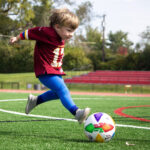December 30, 2025
AUTISM AWARENESS MONTH

FEATURED POSTS
December 15, 2025
December 11, 2025
By: Ronit Molko
Like many pregnant women, I spent a lot of time during my first pregnancy worrying about whether my child would have autism or down’s syndrome, as those were the developmental disorders most commonly seen and talked about. I was working at the Neuropsychiatric Institute at UCLA at the time and the psychiatrist who was supervising my work sat me down one day in front of a large book about developmental and genetic disorders and told me that if I was going to spend my time worrying, I should give equal time to every possible thing that could go wrong for my unborn baby. I realized at that moment, that instead of riding the wave of this state of panic that is so easily encouraged in our society, I could change my own attitude and focus on helping to shift the fears and ideals of our population to something more authentic, proactive and meaningful.
Our society and now social media has created many myths and misunderstandings about developmental disabilities. Inaccurate information is often easily accessed with no professional sounding board to help parents know what is fact or fiction, nor to help them design and manage a path of services that will lead to the best possible outcome for their family and for their child’s future.
One of the biggest issues I see families struggle with is the lack of understanding and acceptance in their general and immediate communities. We need to find a way to open up the discussions in our communities, our circles of friends and among our families to begin to build true awareness of the very high prevalence of developmental disabilities. We need to consider when, where and how we can begin to bridge the gaps of misinformation or just plain ignorance of the real facts about the well being of our youth and the special needs of a growing/aging population. The earlier we include all our children in this conversation, the sooner we can create communities where each person is celebrated for their gifts and talents, and where each person is taken care of. Let’s reframe our approach to “awareness”. It is not about t-shirts, bumper stickers or an annual event we show up to. True awareness will take root when we realize that every one of us matters in this conversation.
Imagine the good we could do for our sisters and brothers if all of us had a greater understanding of what to look for, how to approach it and where to get help. Imagine how much more quickly all our children could make progress with everyone in their environment supporting their needs and advocating on their behalf. Nobody benefits from scare tactics, sympathy or soap boxes. But I believe that everyone wins with openness, communication and thoughtful regard for the many special lives among us …and those yet to be.





